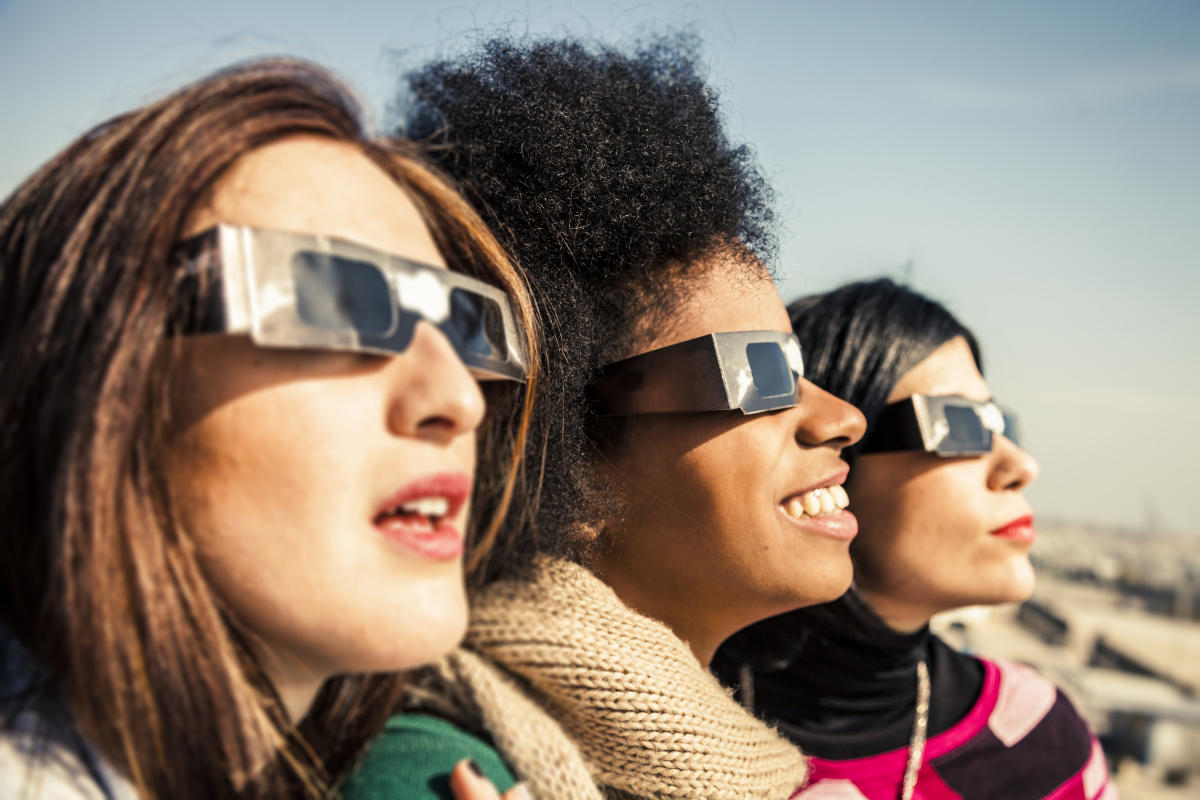
 Looking directly at the Sun is unsafe except during the brief total phase of a solar eclipse (“totality”), when the Moon entirely blocks the Sun’s bright face, which will happen only within the narrow path of totality. If your eyes are exposed to the sun without the appropriate protection, it can cause “eclipse blindness,” which can temporarily or permanently damage your eyes.
Looking directly at the Sun is unsafe except during the brief total phase of a solar eclipse (“totality”), when the Moon entirely blocks the Sun’s bright face, which will happen only within the narrow path of totality. If your eyes are exposed to the sun without the appropriate protection, it can cause “eclipse blindness,” which can temporarily or permanently damage your eyes.
The only safe way to look directly at the uneclipsed or partially eclipsed Sun is through special-purpose solar filters, such as “eclipse glasses” or hand-held solar viewers. Homemade filters or ordinary sunglasses, even very dark ones, are not safe for looking at the Sun.
Stand still and cover your eyes with your eclipse glasses or solar viewer before looking up at the bright Sun. After glancing at the Sun, turn away and remove your filter — do not remove it while looking at the Sun.
Do not look at the uneclipsed or partially eclipsed Sun through an unfiltered camera, telescope, binoculars, or other optical device. Similarly, do not look at the Sun through a camera, a telescope, binoculars, or any other optical device while using your eclipse glasses or hand-held solar viewer — the concentrated solar rays will damage the filter and enter your eye(s), causing serious injury. Seek expert advice from an astronomer before using a solar filter with a camera, a telescope, binoculars, or any other optical device.

One of the best ways to view a solar eclipse is through a pinhole projector where you look at a projected image made through a pinhole in cardboard paper. Or even easier, grab a colander from the kitchen (not the mesh kind, the one with holes in plastic or metal)!
A. Get a cardboard box. Punch a hole into one of the ends (I use one of the smaller ends to make a longer path so a bigger image). Since the cardboard may have ragged edges from the punched hole, I generally just make the cardboard hole larger and then cover it up with a piece of thick paper and punch a smaller hole in it. Put a sheet of white paper into the opposite end. You may need to tilt the box, propping it up, to see the image.
B. For a brighter image, if you just make the pinhole larger, it will get fuzzy. Instead, make a larger hole but use a pair of inexpensive reading glasses to focus the image inside the box. The image still won’t be very large, but it will be brighter and in better focus. You may need to adjust the placement of the box (the best strength of the reader depends on the length of the box: 2 or 2.5 magnification works well with a 14-16 inch box).
C. This shows the image inside the box. For a neat solar projector using a drinking cup and readers, see Rice Space Institute's "plastic cup solar projector" activity
Always inspect your solar filter before use; if scratched or damaged, discard it. Read and follow any instructions printed on or packaged with the filter. Always supervise children using solar filters.
Before you buy a solar viewer or filter online, we recommend that you make sure that (1) the seller is identified on the site and (2) the seller is listed on the AAS page: Suppliers of Safe Solar Viewers & Filters | Solar Eclipse Across America (aas.org)